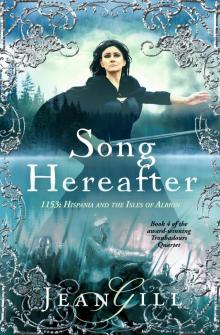Bladesong Read online
Page 16
To which Gilles retorted that she didn’t need to go to Dragonetz for protection if she could look after herself. As they both knew it would, the argument finished with Estela’s bald statement that she was going anyway, and Gilles’ equally defiant riposte that he was going with her. And on that ‘Well then!’ note, they refused to speak to each other for at least a day, and then pretended there was no disagreement, Gilles continuing in his usual obedience to his Liege, albeit a Liege he had looked after since she was a baby.
Bèatriz was disappointed to lose her troubadour before the wedding but when the advantages of this were hinted to her, notably her own capacity to shine without other women songbirds sharing the limelight, it was possible for her to be pleased at Estela’s good fortune in being summoned by Queen Mélisende. For so de Rançon had presented matters to Bèatriz, and he assured Estela that it was no more than truth.
Although he’d presented Estela with the private message from Dragonetz, it was Queen Mélisende’s wish that the two of them join her court as troubadours, which had led Dragonetz to send such a message. Estela struggled to take in all that she was being told. She knew nothing of politics Oltra mar - another matter to put right on the long sea voyage, she told herself.
However, it seemed only natural that the Queen would want Dragonetz at her court, as had Aliénor, as had Ermengarda. At the thought of the golden lady of Narbonne, who had drawn Dragonetz very close to her, Estela hoped that Queen Mélisende was as wrinkled as she ought to be at the age of forty-six. It was also natural that the Queen would be happy with the partnership that Estela and Dragonetz made as troubadours but to be worthy of the court in Jerusalem, Estela needed some practice. Luck had given her someone to practice with. Ignoring every reflex that said, ‘This is no Dragonetz’, Estela threw herself into working with de Rançon.
There was so little time to prepare that it made sense to choose from the traditional lays that they both knew well, rather than adventure into Estela’s work, which of course was new to de Rançon. Although no troubadour, happily admitting that he composed nothing himself, de Rançon was no mean musician and his singing voice was an agile tenor, capable of runs and trills that would have defeated Dragonetz’ rich baritone.
Humming as she stitched another infernal piece of linen for Bèatriz’ trousseau, Estela smiled to herself, remembering some twist of the lyric they had contrived to amuse the audience, or an unexpected split of strophes between the two of them, which changed the meaning along with the voice. She knew the alchemy of music would work between them and Bèatriz would have a farewell performance from her troubadour to prepare the way for all the celebrations planned for the coming months.
There had been only one sour note in their rehearsals. Estela had lost herself in Rudel’s beautiful song, eyes tight shut, thinking how soon she would be in Dragonetz’ arms. As the last notes died, Estela still dreaming of her ‘amor de lonh’, de Rançon laughed and said conversationally, ‘As Dragonetz tells the story, Rudel died in the arms of a whore, paid to play the lady of Tripoli so the poor fool could die happy. The illusions of love!’
‘But everyone knows the story, how he loved the Comtesse de Tripoli just from hearing about her, how he fell ill on his way Oltra mar but reached the shore, only to die in his lover’s arms.’
‘My sweet, romantic Estela, I am sure you must be right,’ de Rançon had teased. ‘It would certainly spoil the story if the man had died of the dysentery in a whore’s arms. No, the more I think on it, the more I am sure you must be right and Dragonetz wrong. You know what Dragonetz is like!’
The ground on which she walked seemed suddenly shaky to Estela, as if the small cracks in the paving were growing large. Did she know what Dragonetz was like? Sometimes, listening to de Rançon, she felt she was hearing about a stranger. Was this what men were like when alone together? Cynicism and crude jokes? What had Dragonetz really said about her, Estela? That she was a whore playing the lady? She flushed. Suddenly anything seemed possible.
‘I’ve changed my mind. We’ll leave ‘amor de lonh’ out of the programme. Everyone sings it,’ she told de Rançon, who looked sharply at her but said nothing. She liked his sensitivity. She was growing used to his manner, the way he adapted his company to her mood, the luminous gaze. When she was with him, she felt like she was the centre of his universe, beautiful, talented. Of course, he was merely representing his friend, but it was only human to enjoy such attentions. He had even won over Gilles, by sheer practicality.
‘You can’t take coffers. Not even one coffer,’ Gilles told her bluntly. ‘De Rançon has told me what’s involved in this journey and if you take half of what you want, you won’t see Dragonetz for another two years. We want you to ride light, a real horse not a palfrey, and just saddle-bags on pack-horses, no wagons. If we camp overnight that will save time too. I told him you were game for it. Are you, Roxie?’
‘Of course!’ she told him, silently dismissing gowns and jewels, presents to smooth her way Oltra mar. She would not leave her healing box, nor the pathfinder runic brooch, but she could not take her water-clock, the only memento of Dragonetz remaining to her. She would take the little paper book, a present from Malik in which her songs were written, and a quill. She could use the charcoal from their campfires for ink. She had so few personal possessions for one of her age and status.
‘De Rançon says you can buy clothes in Acre, or in Jerusalem, and the climate will be mild so there is no need of your Dia wools, just some light gowns, underthings, a few toiletries and your cloak.’ It made Estela feel strange to think of the two men discussing her so intimately.
‘Riding,’ she said. Obviously, with a ‘real’ horse she would be riding astride, her usual custom, although she had ridden side-saddle in the company of a baggage-train, and on a suitably docile palfrey. Riding astride required full, circular skirts, and they dirtied so from horse sweat. A long journey would rub her legs raw too. She made her mind up. ‘I want a thick pair of men’s hose,’ she told Gilles. In response to his air of startled query, she explained, ‘To wear underneath a riding gown. It’s not just horses who get saddle-sore.’ He nodded.
She considered the journey. Aboard ship, there would be no problem. Ordinary day clothes would suffice and she saw no need to pack anything for performance or show. She would indeed need coin to purchase court clothes once she was Oltra mar. She mentally put the jewels back in her saddle-bags - she would need the wherewithal to barter.
‘How will we travel from Acre to Jerusalem?’ she asked Gilles, feeling more comfortable at showing her ignorance to her man than to her new friend. ‘Camel train’ was the short reply. Estela concluded that there was only so much planning that a woman could do in advance and she concentrated instead on something she did know about. Her voice had fully recovered from emotional strain and lack of use, her eyes were no longer melancholy pits above purple shadows. She was ready to sing for the Lords of Dia one last time.
Chapter 13
Estela curtseyed yet again, while the applause continued unabated round the Great Hall of Dia. Her right hand was lightly imprisoned in her partner’s and de Rançon raised it high, acknowledging her and their audience. Her oud clutched firmly under her left arm, Estela steeled her thoughts away from another hall, another man at her side. There was always closeness from singing a duet, matching rhythms and playing with harmonies, and Estela was not immune to de Rançon’s glittering energy, the heat of his hand enclosing her own. However, she had enough experience of performance to distinguish the fever-rush that came after she’d lost herself in song and listeners’ spellbound faces, from the feelings that could outface the morning sun. There was only one man she wanted to wake with of a morning, every morning.
De Rançon raised their hands one last time for the audience to yell appreciation and the volume diminished enough to let the duo know it was time to cede the floor.
‘Thank you,’ de Rançon told her, kissing the captive hand before he released it, bowing to he
r in personal homage before clearing a way for her back to their prestigious seats, at one end of the high table. Still hot from the touch of his lips, Estela’s adventurous hand brushed against the hard gold buckle fastening a sash swathed round her hips and the burning sensation made her jump. Her pathfinder brooch was a prize gifted to her in a tournay of song at Narbonne, by a Viking Prince, and its runes supposedly held powers. When a fortune-teller had tried to read Estela’s future, the pathfinder had blocked her visions. Not that Estela believed such rubbish and the prophecy given when the pathfinder had been removed merely played on Estela’s guilt and fears. Mere generalities that would be true for everyone.
Her hand still stung a little from the contact, a warning, if she were feeling fanciful. The pathfinder showed roads, crossroads and choices. She hadn’t looked at it or thought about it for months, her decisions all driven from the head, all inevitable. If there were no choices, there was no benefit to holding the great brooch, tracing each possibility along the path runes, wondering which way she should go. Was there a choice now, she wondered? Something she was missing?
She eased herself behind the trestle table, accepted the compliments passed on to her via the courtiers sitting between her and the rulers of Dia, central at table. One space showed the absence of Bèatriz, who was to conclude the entertainment and who was already tuning her mandora. She was no longer the shy youngster whom Estela had taken under her wing at the court of Narbonne over a year ago. The heiress of Dia showed all the assurance of her birth and education as she waited for hush and then filled the farthest corners of the hall with the opening lines of one of her own compositions.
A love song, noted Estela without surprise. Equally predictable was the way the singer’s eyes were drawn to the high table as she sang, not to her parents but to a young man paying tribute to Dia from his own realm further south. Raimbaut d’Aurenja, who had squired Bèatriz at the extravagant Court of Love staged in Narbonne, a year ago. Much of an age with Bèatriz, the heir to Aurenja had filled out, losing - or hiding - the air of being poised for flight which had struck Estela when she had first seen him. An honoured guest in Dia, he nodded his dark head to the melody, smiling at the singer. Some things had not changed in a year and expedient marriages were unlikely to alter the alchemy between these two. Already a troubadour of note, Raimbaut was certainly capable of appreciating Bèatriz’ talents. And there was no doubt that she was talented. Time for me to leave the floor to Bèatriz permanently, Estela told the pathfinder.
‘A sweet voice, but lacks maturity,’ whispered de Rançon in her ear and Estela’s stomach lurched. That was exactly what Dragonetz had said about her own singing when they’d first met.
‘Her lyrics are beautiful,’ Estela responded, truthfully.
‘Granted. And she has good technique. How could she not, with you as a teacher? But you have a woman’s voice. You sing with a woman’s feelings. She’s still a girl.’
Estela bit her lip and said nothing. The pages refilled the jugs with celebration wine, the specialty of this cold province, and Estela took a sweet draught of the sparkling white liquid. She shivered.
Eyes fixed on the flames dancing in the braziers, her companion murmured, as if to himself. ‘They tell me this wine has been made here for hundreds and hundreds of years, that Pliny the Elder wrote of how the Voconce tribes placed jugs of white wine in the rivers in autumn and lifted them in spring to find them alchemised and effervescent.
My Lady,’ he turned his gaze on her but she refused to meet his eyes, ‘I think you have alchemised in Dia. You are, and are not, as Dragonetz described you. You have been alone in deep currents in the chill of Dia winter and something has changed.’
‘I can hide nothing from you,’ Estela laughed, though one corner of her mouth disobeyed her attempt at levity. ‘I am all froth and fizz like the Clairette.’
His voice urgent, his eyes still fixed on her, de Rançon said, ‘I have heard tales of a cave in the Vercors mountains, an hour’s climb from here on horse, where the ice never melts but forms strange sculptures, unicorns and maidens, narwhals and lovers.
Should a man take his lady there, lay her on ice and warm her with his own body, so she feels chill and heat, ice and passion, the tingle of cold... it is said that they may reach out at such a moment and a jug of Clairette will appear.
One sip each from this jug will fill them with the ice of its making and the fire of its opening so that they are fused inseparably, forever.’
Estela gasped as chill exploded against her arm, tingling every small hair, rushing confusion through her senses until she realised it was merely the jug of Clairette held wickedly against her bare flesh.
‘Of course, it’s just a local story,’ smiled de Rançon. ‘Would you like some more wine?’ Wordless, Estela held out her goblet and met his eyes. Diamonds, she thought, prisms, straight lines and wrong-coloured rainbows, misdirections, reflecting what’s not there... ice, being stroked with ice, open to ice... She shivered again.
‘Are you all right?’ de Rançon asked her, all concern.
‘I’ll be glad to head south for warmer weather and not face another winter here! No more talk of ice, please. Tell me about Oltra mar and the peoples there, and about Dragonetz.’ Estela stroked pathfinder absent-mindedly but found nor ice nor fire in the touch. If the great brooch had been a cat it would have been purring in her lap, self-absorbed. Not like a white dog, who would have raised one eye, watching, always watching, to see what worried his mistress and where the threat might be.
Estela’s last performance at the court of Dia was followed by packing and leave-taking. The former was supervised by Gilles, impervious to Estela’s tears over what must be left; the latter was organised by Estela, impervious to the people who must be left. Comte Isoard, grizzled and expressionless, accepted her explanation that she was invited to sing at the court of Jerusalem and could not turn down such an honour, Lady Bèatriz having graciously given consent.
Estela fended off a polite enquiry about her son’s wellbeing in Paris and her answer seemed enough to satisfy the Comtessa’s curiosity. Isoard’s wife, Bèatriz’ mother, was a woman who disappeared into the background, whether from experience or nature Estela didn’t know, but there was an absence of personality that made connection difficult. Not so with Bèatriz, who flung herself tearfully into Estela’s arms, recalling their meeting in Narbonne, their music lessons.
Estela disentangled herself from the young woman’s embrace and laughed at her fears. ‘It has been a long time since you needed either a teacher or another trobairitz at this court!’ She shook her head. ‘Your melodies lilt through my head and stay there, every note just. And your way with rhyme is unmatched! The coblas in that last song you performed - wonderful! Estela threw back her head and sang from memory,
Ab joi et ab joven m’apais
E jois et joven m’apaia
Car mos amics es lo plus gais
Per qu’ieu sui coindet’e gaia
On youth and joy I thrive
Aye more joyful, youthful
Because my friend’s alive
With mischief, never rueful
The coblas doblas are so clever, so much work, but the result appears so effortless! The words make me want to dance, make me feel like a girl again.’ She whirled Bèatriz into some dance steps, singing the next lines badly, out of breath from twirling. ‘You have a great talent, Bèatriz.’
The young heiress flushed with pleasure. ‘Do you really think so? You sing so much better than I do.’
‘Your voice is improving all the time. And your songs are as good as anyone’s!’ Estela told her firmly.
‘I wrote that song for Raimbaut,’ Bèatriz confessed shyly.
Estela tried to look surprised. ‘And I’m sure he appreciates it.’
‘He does.’ The oval face was serious. ‘He suggested I try a flute accompaniment.’
Troubadours! thought Estela, remembering with a pang her own mix of music and love talk
with Dragonetz. Actually, the flute would work well with Bèatriz’ voice. ‘I think he might be right. Just for some phrases though.’ She hummed a trill. ‘There.’
‘I thank you.’ Bèatriz’ eyes glowed. ‘I will always remember what you’ve given me.’ Once more the future Comtessa of Dia, she held out an imperious hand to be kissed in leave-taking. Estela hid a smile as she made obeisance. Bèatriz clearly couldn’t wait for Estela to leave, so she could score some phrases for the flute. Troubadours! It was time to go, leaving Bèatriz to her marriage and her estate, her lover and her songs, whatever the future might hold for her.
De Rançon’s party assembled at dawn, ready to depart as soon as the gates were opened and to make the most of a day’s travel. Without a backward glance, Estela dug her heels into the temperamental roan charger she’d been given as a mount, more suited to her size than those the men rode but clearly still a war horse, no palfrey. She thanked God and Gilles for woollen hose and for her training with her father’s fast hunters, and let the horse follow his instincts, matching his running walk to that of his fellows as the road opened up.
From Dia the band followed the river Droma west on the trade route towards Lion, the very road that Raoulf had pretended to take. Was it really such a short time ago? How much had changed! De Rançon had briefed Estela and Gilles as to the planned route and received curt nods from both in agreement to the punishing ride. A hard first day would take them to the fortified town of Crest, but there was no intention of seeking shelter behind those walls with the lord of Crest.
Time spent in chateaux or abbeys would add wasted days, exchanging news, explanations and courtesies. No, the plan was that the party, comprising a dozen armed men, plus de Rançon, Estela and Gilles, would camp off the road each night, soldier fashion. Estela saw no need to point out that this would not be her first such night, nor that a saddle-bag for a pillow and a thick woollen cloak for blanket were an improvement on her past experience. She merely gave her assent. Gilles hesitated, concerned for Estela’s safety without a city wall, but a withering response from de Rançon regarding the training - and discipline - of his men, silenced him. This was no longer the de Rançon of sparkling eyes and words but a seasoned Crusader, who gave clear, practical orders to his men and got instant obedience.

 Queen of the Warrior Bees
Queen of the Warrior Bees Song Hereafter
Song Hereafter Someone to Look Up To
Someone to Look Up To Bladesong
Bladesong How Blue Is My Valley
How Blue Is My Valley Plaint for Provence
Plaint for Provence Song at Dawn: 1150 in Provence (The Troubadours Quartet)
Song at Dawn: 1150 in Provence (The Troubadours Quartet)